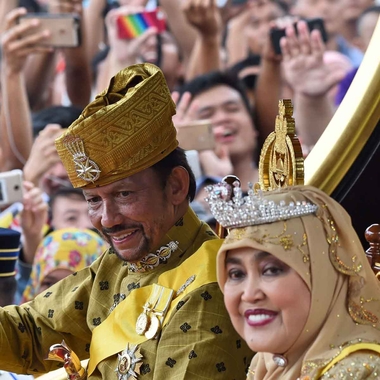'Barbaric to the core': Brunei brings in gay sex stoning law

Brunei is enacting strict new Islamic laws that make gay sex and adultery punishable by stoning to death, despite fierce global condemnation.
The tiny, Muslim-majority kingdom in 2014 became the first East Asian country to introduce Sharia law at a national level. The government introduced the legislation and associated penalties in stages, with the new measures set to begin Wednesday, April 3.
Under stages two and three of the penal code, sex between two men and adultery both carry a punishment of stoning to death, while sex between two women is punishable with 100 lashes.
The law also introduces harsh penalties such as amputation of limbs for stealing, and imprisonment for dressing as someone of a different gender.
Brunei, an oil-rich former British protectorate with a population of around 450,000, is ruled by the all powerful Sultan of Brunei, Hassanal Bolkiah, who also acts as prime minister.
Its decision to implement the penalties has sparked an international outcry from governments, rights groups, the UN and numerous celebrities.
In a statement Wednesday, Human Rights Watch described the new penal code as "barbaric to the core" and urged the sultan to "immediately suspend amputations, stoning, and all other rights-abusing provisions and punishments."
The 72-year-old sultan is believed to be among the region's richest people, thanks to Brunei's oil industry. In announcing the introduction of the new laws, the government's website quoted him as saying that his government "does not expect other people to accept and agree with it, but that it would suffice if they just respect the nation in the same way that it also respects them."
On Tuesday, the US State Department joined the criticism, saying the laws run counter to Brunei's international human rights obligations, "including with respect to torture or other cruel, inhuman or degrading treatment or punishment."
Life in fear
Brunei's LGBT community has expressed fear at the prospect of living under the Islamic law. Prior to the introduction of the new code, homosexuality was outlawed and carried a punishment of up to 10 years in prison.
Khairul, a young gay man who spoke to CNN over the phone Tuesday, said the new laws were "inhumane."
"It's a very aggressive punishment. It's not something that a human should suffer ... just because of being a homosexual," he added.
He and others interviewed by CNN for this story asked that their real identities be hidden over concerns for their safety and that of their families.
Transgender woman Zain said she'd been living in fear since 2013, when the sultan first announced the country would introduce Sharia law.
"Everyone is affected. It's just going to be a horrible life living there, even if you're not LGBT," said Zain, who is now seeking asylum in Canada. "Women especially would be at a big disadvantage there."
Under the new laws, if a woman has an abortion, she could face 15 years in prison. Similarly, pregnancy out of wedlock is punishable by up to two years in prison.
The penalties also differ depending on whether the accused is a Muslim, married and the level of evidence. A Muslim who declares themselves a non-Muslim, a god, or who mocks the Quran could also receive the death penalty. By contrast, sexual intercourse with a dead person or an animal carries a maximum 10 year prison sentence.
International outrage
The laws have captured the attention of celebrities, including George Clooney, who called for a boycott of nine hotels linked to the Brunei government.
"Are we really going to help pay for these human rights violations?" he questioned in an opinion piece written for Deadline. "Are we really going to help fund the murder of innocent citizens?"
Singer Elton John and Virgin Group founder Richard Branson have also joined the criticism.
In a statement Tuesday, US State Department spokesman Robert Palladino said that governments have an "obligation to ensure that all people, including LGBTI people, can freely enjoy the universal human rights and fundamental freedoms to which they are entitled."
He added that the US strongly opposes human rights violations and abuses against LGBTI persons "including violence, the criminalization of LGBTI status or conduct, and serious forms of discrimination."
The UN High Commissioner for Human Rights Michelle Bachelet labeled the new law "draconian" and appealed to Brunei's government to halt its implementation.
In a strongly worded statement, Bachelet said the law's introduction would "mark a serious setback for human rights protections for the people of Brunei."
But the country has no plans to change course, according to a statement from the office of Brunei's Prime Minister released Saturday.
"Brunei Darussalam is a sovereign Islamic and fully independent country and, like all other independent countries, enforces its own rule of law," the statement said.
Brunei government agencies have not responded to CNN's inquiries.
By Julia Hollingsworth, Rebecca Wright and Alexandra Field, CNN. The-CNN-Wire™ & © 2019 Cable News Network, Inc., a Time Warner Company. All rights reserved.
The Gayly – April 3, 2019 @ 10:45 a.m. CDT.





